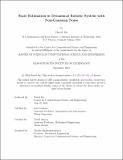State Estimation in Dynamical Robotic System with Non-Gaussian Noise
Author(s)
Jin, David
DownloadThesis PDF (3.262Mb)
Advisor
Carlone, Luca
Terms of use
Metadata
Show full item recordAbstract
State estimation is critical for robot operation. Most estimation algorithms assume that the robotic sensor measurements are contaminated by Gaussian noise. However, in practical applications, the noise is often non-Gaussian, heavy-tailed, or even multi-modal. In this thesis, we develop algorithms that perform state estimation in dynamical systems with arbitrary noise and prove their theoretical guarantees. We tackle two challenging state estimation problems: multi-model point cloud registration and state estimation in polynomial dynamical systems, both contaminated by non-Gaussian noise. In the multi-model 3D registration problem, we are given two point clouds picturing a set of objects at different poses (and possibly including points belonging to the background) and we want to simultaneously reconstruct how all objects moved between the two point clouds. We propose a simple approach based on Expectation-Maximization (EM) and establish theoretical conditions under which the EM approach recovers to the ground truth. We evaluate the approach in simulated and real datasets ranging from table-top scenes to self-driving scenarios and demonstrate its effectiveness. For state estimation in polynomial systems corrupted by arbitrary noise, we develop a new filtering approach called the Generalized Moment Kalman Filter (GMKF). The GMKF formulates the prediction and update steps as polynomial optimization problems (POP) and solves them using moment relaxations, carrying over a possibly non-Gaussian belief. In the linear-Gaussian case, GMKF reduces to the standard Kalman Filter. We demonstrate that GMKF performs well under highly non-Gaussian noise and outperforms common alternatives, including the Extended and Unscented Kalman Filter, and their variants on matrix Lie groups. We also showcase applications to challenging landmark-based and lidar-based robot localization problems.
Date issued
2024-09Department
Massachusetts Institute of Technology. Center for Computational Science and EngineeringPublisher
Massachusetts Institute of Technology